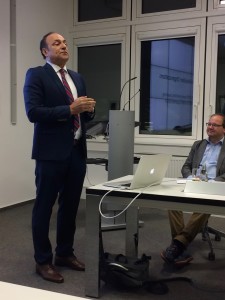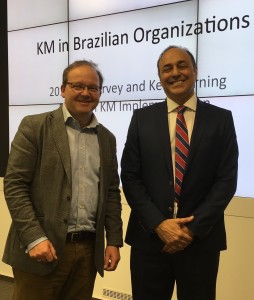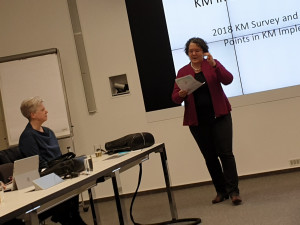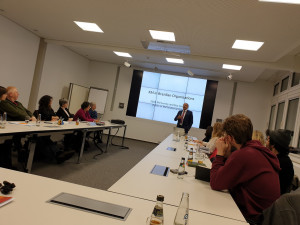Knowledge Management in Brazilian Organizations
„Knowledge management must be aligned with the strategic objectives of the organisation and should be aimed at improving the organisational performance, whether they are efficiency improvements or improving the service provided to citizens by public organisations. Only then will knowledge management gain the necessary attention and acceptance in organizations in the long term,“ is the conclusion of Prof. Fábio Ferreira Batista from Brasília (Brazil), who reported on his experiences with knowledge management in Brazil on 5 March 2019 at the regional group of the GfWM (Gesellschaft für Wissensmanagement e.V.) at the Fraunhofer Institute in Berlin.
Prof. Batista was invited by Prof. Peter Heisig of the Department of Information Sciences at the University of Applied Sciences Potsdam (FHP) and presented the results of a recent survey by the Brazilian Society for Knowledge Management (SBGC) in 2018. The sharing of best practices, i.e. very good solutions as well as the securing of experience of departing employees, are the current drivers of Knowledge Management Programs in public and private sector organizations in Brazil.
Thus the current challenges hardly differ from those in Germany, says Ms Ute John, President of the German Association for Knowledge Management (GfWM).
Prof. Batista illustrated the practical benefits of the Knowledge Management implementation with an example from the National Civil Aviation Authority of Brazil (Agencia Nacional de Aviação Civil – ANAC), which he had supervised. In a pilot project, the lead time for issuing an aircraft certificate was reduced from an average of 40 days to 2.5 days. This improvement has been achieved through mentoring and coaching of younger employees by two longtime experience carriers, codification of the implicit process knowledge of these experience carriers through process descriptions and checklists as well as knowledge of the correct interpretation of international regulations during the first year. The ANAC example was also recognized as a worldwide best practice example with the Knowledge Management and Intellectual Capital Excellence Award at the ECKM Conference 2016 in Belfast (NI).
The experts and the participants of this exchange meeting finally agreed that „Knowledge management can benefit private and public sector organisations if it is strategically integrated, systematically approached and sustainably supported by managers and employees.
From: Fábio Batista & Peter Heisig
(Prof. Batista has kindly agreed to share his slides with the participants or others interested. Please, contact Ute John)



